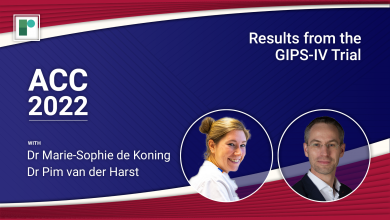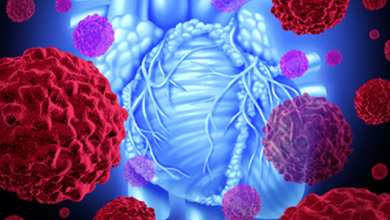Search results
Author(s):
Pim van der Harst
,
Added:
2 years ago
In this short interview from our coverage of the ACC.22 late-breaking trials, Dr Pim van der Harst and Dr Marie-Sophie de Koning (University Medical Center Groningen, NL) discuss the data from the GIPS-IV trial which investigates the safety and efficacy of the hydrogen sulfide (H2S) donor sodium thiosulfate (STS) in patients presenting with ST-segment elevation myocardial infarction (STEMI) …
View more
Author(s):
Joris van den Hurk
Added:
3 years ago
Cardiovascular disease (CVD) is the most common cause of death worldwide.1 With an estimated 7.6 million global deaths due to coronary heart disease in 2005,2 the size of the burden placed on society cannot be understated. Acute myocardial infarction (AMI), the classic ‘heart attack,’ will be the classification given to many of these deaths. In its most life-threatening form, AMI is identified…
View more
Author(s):
Pedro L Sánchez
,
Isaac Pascual Calleja
,
Héctor Bueno
,
et al
Added:
3 years ago
The results of an electrocardiogram (ECG) on admission guide the next level of decision-making for the patient with chest pain suspected of myocardial ischaemia. If an occlusive thrombus forms, patients may develop an acute ST-segment-elevation myocardial infarction (STEMI), and the primary goal is to consider reperfusion therapy as quickly as possible. The benefit obtained by effective and early…
View more
Author(s):
Luc Janssens
Added:
3 years ago
Chronic heart disease is the leading cause of death in both men and women in the US, and coronary artery disease (CAD) constitutes the number one cause among them. Acute ST-segment-elevation myocardial infarction (STEMI) usually occurs when a thrombus forms on a ruptured atheromateus plaque and occludes an epicardial coronary artery. Patient survival depends on several factors, the most important…
View more
Author(s):
Sasha Koul
,
David Erlinge
Added:
3 years ago
Acute coronary syndromes (ACS) are a major reason for death and morbidity in the industrialised world. One of the most successful treatments for ACS has been strategies to target the platelets and inhibit their function.
Mechanisms of Platelet Activation
Thrombus formation in the arteries is dependent on platelets and their ability to attach to the injured wall despite the rapid arterial blood…
View more
Author(s):
Kristina Grønborg Laut
,
Alma Becic Pedersen
,
Timothy L Lash
,
et al
Added:
3 years ago
Coronary heart disease (CHD) remains a leading cause of mortality and disability for both men and women in Europe, accounting for 1.92 million deaths each year.1 One in five women (22%) and one in five men (21%) die from the disease.1 This significant burden necessitates ongoing improvements in patient management and treatment, to minimise the impact of cardiovascular conditions on both patients…
View more
Author(s):
WY Wandy Chan
,
Richard W Troughton
Added:
3 years ago
Acute coronary syndromes (ACS) and acute pulmonary embolism (APE) are leading causes of hospital admission and mortality. Accurate risk stratification is important for both conditions to guide management and the use of therapies that lead to improved outcomes.
Acute Coronary Syndromes
Despite a steady decline in developed countries, ischaemic heart disease is still the leading cause of death…
View more
Author(s):
Hector M Garcia-Garcia
,
Patrick W Serruys
Added:
3 years ago
To date, cardiologists have alleviated the symptoms of patients with significant lesions in the coronary angiography by stenting or coronary artery bypass grafting. While normal-looking coronary segments in angiography have been regarded as ‘disease-free’ and mild/moderate stenoses as ‘non-treatable’, today that we know that from these non-significantly diseased areas may potentially arise acute…
View more
Author(s):
Konstantinos Toutouzas
,
Antonios Karanasos
,
Dimitris Tousoulis
Added:
3 years ago
Acute coronary syndromes (ACS) comprise a major cause of morbidity and mortality. The almost-exclusive cause of ACS, including unstable angina, acute myocardial infarction (AMI) with or without ST-segment elevation, and sudden cardiac death, is atherothrombosis. Pilot pathological studies have identified the pathophysiological processes implicated in the destabilisation and thrombosis of…
View more
Author(s):
David G Gent
,
Rebecca Dobson
Added:
12 months ago












